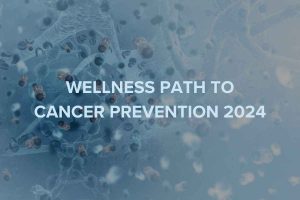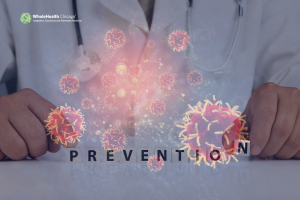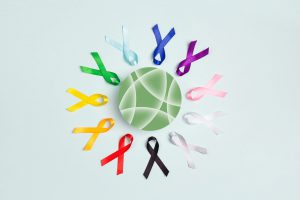Okay, so this Health Tip seems pretty important. After a certain age, every person fears getting cancer (and believe me, doctors are just as fearful as everyone else!). Being told by a health care professional, “I’m sorry but the biopsy confirmed it. You have cancer,” or “We need to find you a good oncologist.”, that […]
Tag: cancer prevention
YES! TELL ME HOW TO PREVENT CANCER!
After a certain age, every person, doctors included, fears getting cancer. Hearing words like, “I see something worrisome on your pancreas” or “this could be leukemia” is a moment you will remember forever. You leave the doctor’s office utterly stunned and wondering “how long have I got?” and asking yourself “what could I have done […]
Wellness Path To Cancer Prevention 2024
After a certain age, every person fears getting cancer (and believe me, doctors are just as fearful as everyone else!). Being told, “I’m sorry but the biopsy confirmed it. You have cancer,” or “we need to find you a good oncologist,” is a moment you will remember the rest of your life. As you leave […]
Why are we Getting Cancer When We’re Younger?
Throughout my earlier years as a physician, cancer was considered a diagnosis of the elderly. A person survived infectious diseases of childhood, heart and lung issues of middle age, and then, blind to the risks of smoking and having no access to colonoscopies or CAT scans, would develop cancer in her seventies or eighties and […]
Wellness Path To Cancer Prevention
After a certain age, every person fears getting cancer (and believe me, doctors are just as skittish as everyone else!). Being told, “I’m sorry you have cancer,” or “we need to find you a good oncologist,” is a moment you will remember forever. You leave the doctor’s office stunned by this information, wondering “how long […]
NBC Nightly News: Multi Cancer Early Detection Test
When you cross over into your 50s and beyond, like it or not your risk for developing cancer increases. If you’re health-conscious, you try to schedule the recommended screening tests: mammogram, Pap smear, skin check, colonoscopy or Cologuard, and lung CT scan for smokers. However, a new blood test changes the odds. I’ve written about […]
Taking Steps Toward Cancer Prevention, Part 2
Last week we began a short series on preventing cancer. Obviously there are no guarantees when it comes to your health. You can do everything exactly right and still get cancer while the next guy lives a life on the edge and dies at 104 with a whisky in one hand and a cigar in […]
Taking Steps Toward Cancer Prevention
According to the latest epidemiologic data, half of you reading this Health Tip will, at some point, hear a variation of the phrase “You have cancer.” If you die (cancer is the second leading cause of death in the US), the type of cancer will appear on the cause-of-death line of your death certificate. It […]
NAC (N-acetylcysteine)
Produced by the body, N-acetylcysteine (commonly called NAC) is a form of the amino acid cysteine. Because it enhances the production of the Enzyme glutathione, one of the body’s powerhouse antioxidants, NAC can both stave off disease and play an important role in boosting the immune system. Studies have shown that glutathione levels are often reduced in people with certain conditions related to the immune system.
Vitamin C and Flavinoids
Vitamin C, an essential antioxidant, is often sold with plant-based substances called flavonoids in a single product. While each supplement can be purchased individually, there are several reasons to consider a product that combines the two.
For one, flavonoids–the catchall term for some 4,000 antioxidant compounds responsible for the color and numerous health benefits of fruits, vegetables, and herbs–enhance the body’s absorption of vitamin C. Key flavonoids include quercetin, rutin, genistein, grape seed extract, and naringen.
Turmeric
Although best known as a spice that gives a distinctive flavor and yellow color to curry powder and mustard, turmeric (Curcuma longa) is a member of the ginger family and has long been used for healing. Ayurveda, Siddha, Unani, and other traditional medicine systems practiced in India have relied on this pungent spice for centuries, and so it’s not surprising that the Asian subcontinent is where the most intensive research about this herb has been conducted.
Selenium
The trace mineral selenium makes its way into our bodies because it is contained in certain foods. Over time, it becomes part of nearly every cell, with particularly high concentrations in the kidneys, liver, pancreas, spleen, and testes.
The most concentrated food source for selenium is the Brazil nut; a single one contains 120 mcg, (which is about twice the RDA). Seafood in general, as well as poultry and meat, are also good sources. So are grains, especially oats and brown rice.
Omega-3 Fatty Acids
Omega-3 fatty acids are a form of polyunsaturated fats, one of four basic types of fat that the body derives from food. (Cholesterol, saturated fat, and monounsaturated fat are the others.) All polyunsaturated fats, including the omega-3s, are increasingly recognized as important to human health.
Eating too many foods rich in saturated fats has been associated with the development of degenerative diseases, including heart disease and even cancer. Polyunsaturated fatty acids, however, are actually good for you. Omega-3s (found primarily in cold-water fish) fall into this category, along with omega-6s, another type of polyunsaturated fatty acids found in grains, most plant-based oils, poultry, and eggs. (For more information, see our WholeHealth Chicago entry on Omega-6 Fatty Acids.)
Green Tea
Legend has it that in ancient times, a Chinese emperor was drinking some hot water when leaves from a nearby tea shrub (Camellia sinensis) dropped into his cup. He apparently liked the soothing drink that resulted from this chance event. And so began what is today a worldwide love affair with tea. It’s now second only to water as the most popular drink in the world.
Flaxseed Oil
A source of fiber for linen fabric since ancient times, the slender flax plant (Linum usitatissimum) also boasts a long history as a healing herb. First cultivated in Europe, the plant’s brown seeds were regularly used to prepare balms for inflamed skin and healing slurries for constipation. Today, flaxseeds–also called linseeds–are best known for the therapeutic oil that is derived by pressing them. Rich in essential fatty acids, or EFAs, flaxseed oil has earned a solid reputation for treating a range of ailments, from heart disease to lupus.
Flavinoids
Flavonoids is the umbrella term given to some 4,000 compounds that impart the colorful pigment to fruits, vegetables and herbs. Also found in legumes, grains and nuts, flavonoids can act as effective antivirals, anti-inflammatories, antihistamines and antioxidants. They’re useful for reducing cancer risk and serve to prevent or treat a wide variety of conditions.
Coenzyme Q10 (CoQ10)
One of the world’s most popular supplements, the chemical coenzyme Q10 has generated great excitement as a heart disease remedy and a cure for countless other conditions. The body naturally produces this compound, which has been dubbed “vitamin Q” because of its essential role in keeping all systems running smoothly. In fact, the scientists who identified coenzyme Q10 in 1957 initially honored its ubiquitous presence–it’s found in every human cell and in all living organisms–by naming it “ubiquinone.” Small amounts are also present in most foods.
Alpha-Lipoic Acid
In the late 1980s, scientists realized that alpha-lipoic acid, a compound initially classified as a vitamin when it was discovered three decades earlier, possessed potent antioxidant properties that could prevent healthy cells from getting damaged by unstable oxygen molecules called free radicals. In fact, this vitaminlike compound has proved to be many times more potent than such old guard antioxidants as vitamins C and E. As a perk, it even recycles C and E (as well as other antioxidants), enhancing their effectiveness.
Resveratrol
Resveratrol is a new and very popular supplement currently recommended by nutritionally oriented physicians, including myself, as avery potent antioxidant that may have potential as an anticancer and cardioprotective compound..
Resveratrol is found in the skins of red grapes and is, therefore, a component of red wine. It is also found in purple grape juice, berries such as blueberries, cranberries, and raspberries, and in smaller amounts in peanuts. In the 1990s, the compound began to attract attention as an explanation of the so-called “French paradox,” namely the low incidence of heart disease among French people despite their diet high in saturated fats.
Cancer Prevention Clip ‘n Save
This month’s issue of the International Journal of Cancer published a report from the Leicester Royal Infirmary in which researchers actually tracked the cancer prevention benefits of certain foods. They were interested in a specific group I’ve mentioned in these Health Tips several times: polyphenols, like those found in green tea.





